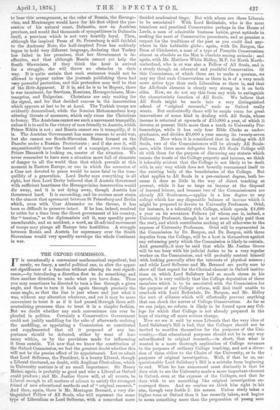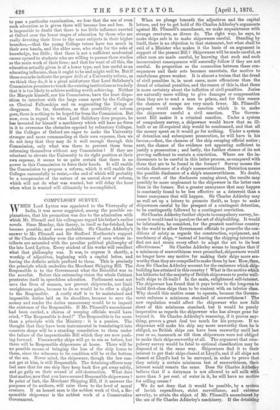THE OXFORD COMMISSION.
TT is occasionally a convenient mathematical expedient, but 1 rarely, we fancy, a useful political one, to alter the appar- ent significance of a function without altering its real signifi- cance,—by introducing a direction first to do something, and then another direction to undo what you have done. Thus you may sometimes be directed to turn a line through a given angle, and then to tarn it back again through precisely the same angle, so that the line is just where and just what it • was, without any alteration whatever, and yet it may be more convenient to treat it as if it had passed. through these self- neutralising processes than to treat it in a simpler fashion. But we doubt whether any such convenience can ever be pleaded in politics. Certainly a Conservative Government could not justify meddling for the sake of afterwards undoing the meddling, or appointing a Commission so constituted and supplemented that all it proposed of any im- portance should be defeated, either by want of har- mony within, or by the provisions made for influencing it from outside. Yet now that we know the constitution of the Oxford Commission, we feel the greatest doubt whether this will not be the precise effect of its appointment. Let us admit that Lord Sellaonae, the President, is a hearty Liberal, though a Liberal tinctured, no doubt, with Anglican Clericalism, which in University matters is of no small importance. Sir Henry Maine, again, is probably as good and wise a Liberal as Oxford could produce ; and Mr. Justice Grove will, at all events, be Liberal enough in all matters of science to satisfy the strongest friend of new educational methods and of " original research." And then, again, there is Mr. Montague Bernard, a very dis- tiquished Fellow of All Souls, who will represent the same type of Liberalism as Lord Selbonae, with a somewhat more
decided academical tinge. But with whom are these Liberals to be associated? With Lord Redesdale, who is the most tenacious and practised Conservative perhaps in the House of Lords, a man of admirable business habits, great aptitude in making the most of Conservative precedents, and as genuine a respect for the traditions of the past as you could find any- where in this habitable globe ; again, with Dr. Burgon, the Dean of Chichester, a man of a type of Puseyite Conservatism almost as obsolete as the Moa is obsolete among animals ; and again, with Mr. Matthew White Ridley, M.P. for North North- umberland, who is or was also a Fellow of All Souls, and is a steady though an educated and youthful Conservative. Of this Commission, of which three are to make a quorum, we may say that such Conservatism as there is, is of a very much more active type than such Liberalism as there is, and that the All-Souls element is clearly very strong in it on both sides. Now, we do not say this from any wish to extinguish the characteristic function of All Souls. We believe that All Souls might be made into a very distinguished school of "original research," such as Oxford really wants. But undoubtedly there will be ample room for great innovations of some kind in dealing with All Souls, whose income is returned at upwards of £15,000 a year, of which it devotes at present little more than a tenth to University Pro- fessorships, while it has only four Bible Clerks as under- graduates, and divides £6,000 a year among its twenty-seven Fellows. Now when it is considered that in dealing with All Souls, two of the Commissioners will be already All Souls- men, while three more delegates from All Souls College will sit with them for the purpose of discussing any statute which recasts the trusts of the College property and income, we think it tolerably evident that the College is not likely to be dealt with in may way which does not heartily recommend itself to the existing body of the beneficiaries of the College. But what applies to All Souls in a pre-eminent degree, both be- cause it does so little in the way of direct teaching at present, while it has so large an income at the disposal of learned leisure, and because two of the Commissioners are already All Souls-men,—applies in a less degree to any college which has any disposable balance of income which it might be prepared to devote to University Professors. Oriel, for instance, is a tolerably rich College, which spends £4,680 a year on its seventeen Fellows (of whom one is, indeed, a University Professor, though he is not more highly paid than the rest), and which contributes nothing at all otherwise to the expense of University Professors. Oriel will be represented in the Commission by Dr. Burgon, and Dr. Burgon, with three deputies from the College, will be a host in themselves against any reforming party which the Commission is likely to contain. And generally, it may be said that while Mr. Justice Grove will be too busy with his judicial duties to be a very regular worker on the Commission, and will probably content himself with looking generally after the interests of physical science ; and while Lord Selborne and Mr. Bernard are pretty sure to show all that regard for the Clerical element in Oxford institu- tions on which Lord Salisbury laid so much stress in his speech, it is very unlikely that the College deputation of three members which is to be associated with the Commission for the purpose of any College reform, will find itself unable to conclude with Lord Redesdale, Dr. Burgon, and Mr. Ridley the sort of alliance.which will effectually prevent anything that can shock the nerves of College Conservatism. As far as we can judge, no reform is likely to be forced upon any Col- lege for which that College is not already prepared in the hope of staving off more serious change.
Now we see it said by some Liberals that the very idea of Lord Salisbury's Bill is bad, that the Colleges should not be invited to sacrifice themselves for the purposes of the Uni- versity,—that educational purposes should not be in any way subordinated to original research,—in short, that what is wanted is a more thorough application of College revenues to the purposes of ordinary College teaching, and not a diver- sion of them either to the Chairs of the University, or to the purposes of original investigation. Well, if that be so, un- questionably Lord Salisbury's Bill is a mistake from beginning to end. What he has announced most distinctly is that he does wish to see the University made a more important element in Oxford, even at the expense of the Colleges, and that he does wish to see something like original investigation en- couraged there. And we confess we think him right in his
aim, though very feeble his means. Unless study takes a higher tone at Oxford than it has recently taken, and begins to mean something more than the preparation of young men to pass a particular examination, we fear that the use of even such education as is given there will become less and less. It is impossible to doubt that there is too little influence exerted at Oxford over the lower stages of education by those who are really devoting their lives to the same subjects in their higher branches,—that the young College tutors have too much in their own hands, and the elder men, who study for the sake of knowledge, too little ; that there is not a sufficient academical career opened to students who are willing to pursue these studies as the main work of their lives; and that for want of all this, the education actually given is of a lower type, and less useful as an educating influence, than it ought to be and might well he. But if these remarks indicate the proper drift of a University reform, as we think they do, it is a great misfortune that Lord Salisbury's Commission promises to touch the existing institutions so tenderly that it is too likely to achieve nothing worth achieving. Neither the Marquis himself, nor his Commission, have the least dispo- sition to interfere with the large sums spent by the Colleges on Clerical Fellowships and on augmenting the livings of clergymen. So far, therefore, as that possibility of reform goes, there is nothing to be hoped for from the Commission. But now, even in regard to what Lord Salisbury does propose, he has invented for himself a machinery which will have no force in it to overcome the obstacles opposed by refractory Colleges. If the Colleges of Oxford are eager to make the University stronger and more commanding at their own expense, then we do not deny that they may do it well enough through this Commission, only what was there to prevent them from reforming themselves without any Commission ? If they are reluctant to elevate the University to its right position at their awn expense, it seems to us quite certain that there is no power in this Commission to force their hands. It will enable the Commission to propose a reform, which it will enable the Colleges successfully to resist,—the end of which will probably be a compromise of the nature of an unreal show of reform, which will not do what was wanted, but will delay the hour when what is wanted will ultimately be accomplished.



































 Previous page
Previous page